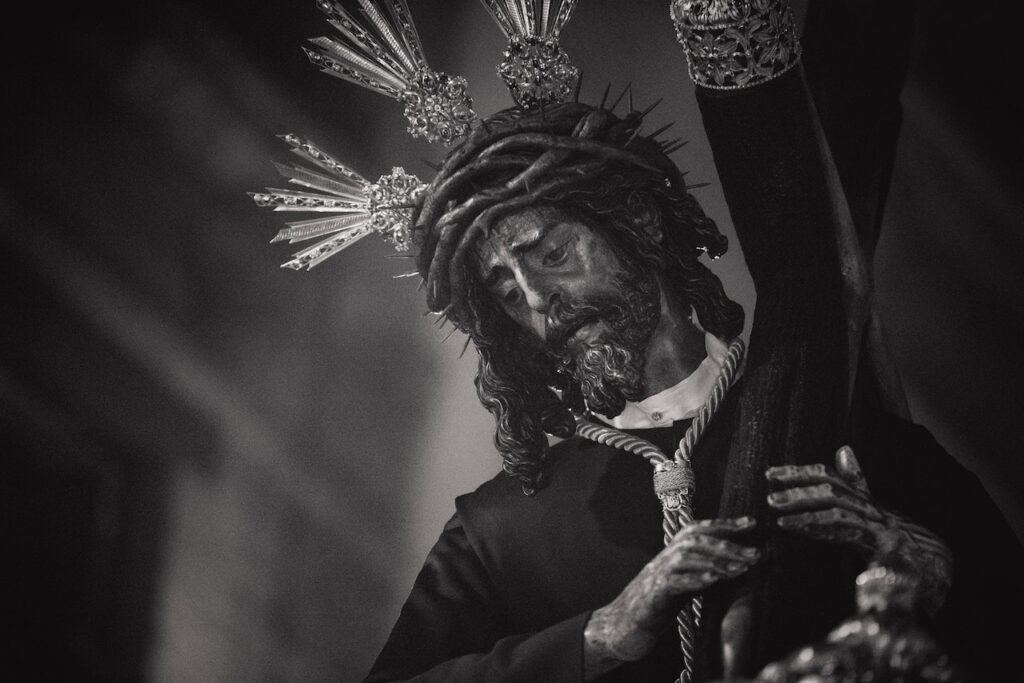Imagine yourself around 8 or 9 years old. You are in a mildly uncomfortable situation. It might be that you’re too hot or too cold; maybe you’re hungry, or it might be that your sister just sneezed on your food. In layman’s terms, one could say that you are most definitely “not living your best life.” You decide to share your complaints about your cruel existence in such an insufferable world with your mother or father. If your childhood were similar to mine, They assumedly would retort your complaint with an ” OFFER IT UP!”. Now, there you are, considering two things; one, if your parents even love you, and two, what does “offer it up” really even mean?
The majority of cradle Catholics are familiar with the above scenario. We’ve heard it countless times and sometimes met it with indifference. Other times we felt encouraged and with a firm resolution to suffer like the Saints. Either way, repeatedly hearing the statement begins to evoke a few questions. If God likes when we offer up our suffering, could it be said that God loves it when we suffer? Does arbitrary suffering somehow make us holier? If God loves us, why does He let us suffer in the first place?
It might just be the biggest obstacle people encounter when contemplating the existence of God. How could God love us and still allow us to undergo such terrible suffering at times?
It undoubtedly deserves an answer and not just an answer but a great answer. Fortunately, in His providential mercy, God has revealed why He has allowed such terrible things to happen to those He loves.
Sin gives way to suffering.
God placed Adam and Eve in the garden of Eden in complete bliss and happiness. In creating them, He desired the total realization of their fulfillment and requested their love in return. He won that love by giving them every possible thing that would make them happy (note happiness, not everything that could cause their pleasure).
As we know, they decided to place themselves at the level of God and seek knowledge before His love. After all, the tree was called the tree of the knowledge of good and evil. Genesis 3:5 states that the serpent said to the woman, “God knows that when you eat fruit from that tree, you will know things you have never known before. Like God, you could tell the difference between good and evil.”
Paradoxically, when Adam and Eve ate the fruit in their quest for knowledge, their minds became flawed and distorted. Wisdom is acquired only as God gives it. God is the source of all meaning. He is the source of truth because he is the source of existence. Consequently, without God, there can be no truth. The absence of God left Adam’s mind susceptible to falsehoods and errant judgment. To choose evil under the assumption of good is precisely what sin is. One only chooses evil when mistaking it for good.
No one chooses what they know to be evil because they know it will harm them. There has to be a perceived good in the act that is worth more than evil.
For example, take a cheating spouse. They know that if they cheat they might lose their family. However, they judge that whatever they receive in the act is worth more to them than the possible bad that may be a consequence. To take the explanation a step further, we can examine a satanist. Externally, it appears they are willingly seeking evil only because it’s evil. But in reality, they are falsely judging evil to be good because they have chosen an adversarial relationship with God.
A damaged ability to reason results in continuously choosing what is disordered. Imagine someone who can’t see well at the gas pump. Their car takes regular gas but because of their vision, are unable to see that they’ve been giving their car diesel. The engine then starts to make strange noises and functions improperly.
Such is sin. We choose what we believe to be good when it harms our level of happiness. Partaking in what is disordered for our nature causes interior or exterior dysfunction. The repeated dysfunction causes complete destruction. The car is our soul; the improper fuel is sin; the dysfunction causes suffering.
Suffering results from a disordered world precipitated by Adam’s (and our) sin. However, God loves His creature limitlessly and is constantly drawing His creation back to Himself and the perfection of love.
God sends his son to redeem us and sanctify our suffering.
It would be unnecessary to explain the story of redemption as we are most likely intimately familiar with it, yet, the intrinsic qualities remain noteworthy for explaining how suffering fits into our salvation.
Justice demands that man loves God every moment he exists. When man sins, he creates a void in the unending flow of love owed to God.
Christ fills this void mysteriously and mystically. He incarnates and becomes entirely human while remaining God. With His humanity, He raises the acts of all humans to a Divine level. If we mimic anything He completed during his earthly life, we participate in a Divine act motivated by God’s Will and his pure love.
In this process, He allows us to love God and each other with His own love. His love has no beginning or end because it has no contingencies. It is only concerned with the good of the beloved regardless of what it may endure while achieving that good.
At the moment of Christ’s incarnation, He subjected himself to suffering. The human form is lesser than Christ’s original form of pure spirit. Christ intimately experienced the limitations and ailments that all humans experience at the moment of his conception resulting in his intense and constant suffering (CCC, 385). Imagine being completely fulfilled in heavenly and trinitarian bliss and then humbly reducing yourself to the form of a microscopic human embryo.
Christ loves in a Divine manner by disregarding His own suffering to fill the void of love experienced by God the Father and to repair our transgressions through His acquisition of super-abundant grace.
Our redemption is won through Christ becoming one of us and enabling us to love Divinely through imitating His example. Christ did not condescend to us but instead elevates us because of His infinite love.
Our suffering is now eternally linked with Christ’s.
St. Pope John Paul 2 explains in his encyclical, Salvifici Dolores, “In bringing about the redemption through suffering, Christ’s suffering also raised human suffering to the level of the redemption. Thus each man, in their suffering, can also become a sharer in the redemptive suffering of Christ. It would be hard to think of a more sublime doctrine than this. Christ so loved us and empathized with our pain that he desired to feel it as we do. He changed our suffering from something terrible into something beautiful; into a means of intimacy with the Divine.
With the prospect of our suffering sharing in the redemptive power of Christ, what is our suffering not worth? With the grace of Christ’s incarnation we can fill the void of love that God experiences on behalf of all mankind.
Uniting our suffering with Christ’s also leads to the healing of our lack of virtue. Virtue can only grow under duress. If we wish to grow in patience, we must act with an even temper when it’s burdensome. If we desire to expand in charity, we must love God when it’s easier to love ourselves. Imagine an Olympic athlete. They don’t learn exercises, wake up early, receive all the appropriate nutrition then lie on their back, relax, and expect their bodies to grow.
Most wouldn’t consider this suffering. One would say that the strenuous workouts they’re committing to are something they’re willfully undertaking to achieve their goal. This thinking asserts that the existence of suffering resides in our mentality. Suffering sustained while pursuing a goal is not suffering at all but exercise.
We must have this same mentality to become Saints. We must embrace our crosses with joy, knowing that our suffering has infinite value. In this frame of mind, we grow in the virtue associated with that particular cross.
With a gift such as suffering, it’s important not to let it waste away.
Take advantage of the crosses God sends, so they may be counted among his redemptive works.
The idea of meritorious suffering brings a new light to listening to our children cry, being sick, or dealing with a less-than-pleasant co-worker. This awareness potentially makes suffering more bearable and encourages us to suffer without complaint because we know how much it benefits ourselves and others.
St John of the Cross regularly prayed that God sent him suffering every day and that if he experienced a day without a cross, he knew God no longer loved him. He actually longed for suffering. His example inspires a new light with which we can advance the doctrine of suffering in our own lives. Instead of meeting our suffering with an attitude of resignation, we can experience it with an attitude of willingness to suffer. While not forgetting the infinite value of suffering, we can view it, not as an obstacle that we pray we can tolerate, but rather as a gift that God lovingly gives us.
Everything that happens to us is willed by God perfectly or permissively. If He allows it, we can deduce that there must be some good He can bring about by it. However, that good is contingent upon our wills. We receive no spiritual benefit if we do not accept the cross that God sends our direction. But on the contrary, if we encounter a cross, we acknowledge it, thank God for it, and offer the suffering in love, the merit is endless! We are now completely unified with God’s Will despite our own suffering. We are choosing to love God with His own love, as made possible by Christ’s humanity.
True discipleship resides in the cross.
Christ was adamant about the cross’s role in our salvation. He knew the reparative power He gave to it and earnestly wishes that we embrace it for the love of him as He embraced it for the love of us.
Luke 14:27 states, “Whoever does not carry his cross and come after Me cannot be My disciple.” He asserts that we all have crosses; we can’t ignore them. Our cross should be part of us in the way our arms or legs are. The cross must be received for us to grow.
Suffering is inevitable. If we are going to feel it regardless, why should we not grow from it?
As Christians, we must embrace the counter-culturality of Christ present in His cross; from it, we must receive what it truly is His will and his salvation through a share in this salvific suffering.

